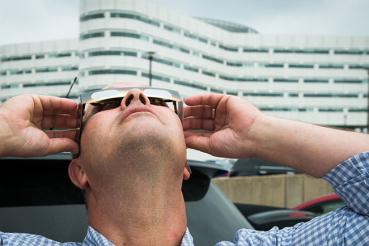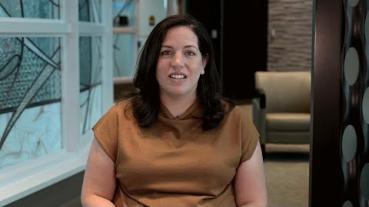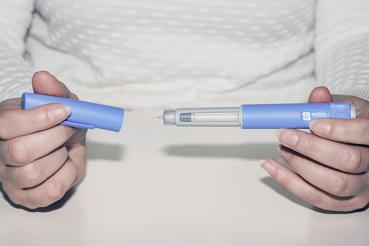Compared to jobs in such famously dangerous fields as construction, transportation and mining, office work might seem safe. Don't let that make you complacent.
Desk jobs, too, can pose dangers to your health. Rush primary care physician Patricia Graham, MD, recently discussed some of the most common hazards — and how to avoid them.
Chairs
A growing body of research suggests that simply sitting too much can endanger your health — regardless of whether you get the recommended 30 minutes of exercise at least five days a week.
Researchers have found that too much sitting might make you less sensitive to insulin (a hormone that helps your body process and use energy from food). It also might lead to higher levels of triglycerides, or fats, in your blood. Such effects could, in turn, make you more likely to develop diabetes, heart disease or even cancer.
One study showed that regularly sitting for six or more hours in a row increased subjects' risk of dying from cancer or heart disease, even if they exercised regularly, ate well and maintained a healthy weight.
Your health, then, might depend not only on whether you exercise but also on what you do when you’re not exercising.
"Our bodies need to move at least every hour," Graham says. "So if you sit at work all day, try to get up walk for a few minutes or even stretch and fidget around. And when you get home, don't just sit down in front of the TV."
Screens
Frequent breaks during your workday can also help protect your eyes.
"It's not just sitting, but sitting in front of a computer for hours at a time that can be harmful," Graham says. "Your eyes get tired staring at a screen too long. You might have muscle strain, irritation or dryness in your eyes."
These problems tend to be temporary, but they can cause significant discomfort. To avoid them, try using a glare shield on your screen or closing the shades when the sun shines too brightly.
Another thing to avoid is working too late into the night. Some research has shown that looking at a screen within a couple of hours of going to bed can interfere with the hormones that help you to sleep.
Keyboards and mice
Repetitive stress injuries, such as carpal tunnel syndrome or tendinitis, are some of the most common office-related injuries. They occur when you pinch a nerve or strain a tendon from repeatedly making the same motion, such as typing on a keyboard or scrolling with a mouse.
Graham says that having an adjustable chair and keyboard tray — so that you can adjust the angle of your wrists and elbows — can help prevent these injuries. So can taking breaks from the activities that cause the strain.
Cords and boxes
But when you get up for your breaks, be careful.
"Several of my patients have mentioned to me that in their offices there are stray cords and boxes in places where you could trip over them or where they could fall on you," Graham says. "You have to be very aware of your work environment. If it's possible to designate someone in the workplace who can deal with safety issues, that is ideal."
It's not just sitting, but sitting in front of a computer for hours at a time that can be harmful.
Food
Another major break-time hazard is food.
"We should try to be alert to the fact that the sugary treats we all bring to work to celebrate a birthday or just because it's Friday can become part of a trend that leads to long-term health problems such as obesity and diabetes," Graham says.
"It's nice to have some treats but better for us in the long run if this can be balanced with healthy options. I think events calling for food occur often enough that we should try to bring in a healthy array of foods."
So if you're planning a celebration at work, try including options such as fruit, nuts, vegetables or yogurt. Graham also suggests organizing office potlucks to which everyone brings a healthy part of a meal.
"Sharing good habits with your coworkers can increase everyone's motivation," she says.
Germs
No matter how good their habits are, though, coworkers can harm each other when they're sick.
To avoid passing along a cold or flu, cover your mouth when you cough or sneeze and wash your hands afterward. And always wash your hands — for at least 20 seconds with soap and water — before and after you eat or use the restroom.
Of course, people aren't the only places where germs can live: "Many desktops are dirtier than a toilet seat," Graham says. "Make sure you wipe down your workspace at least once a week."




